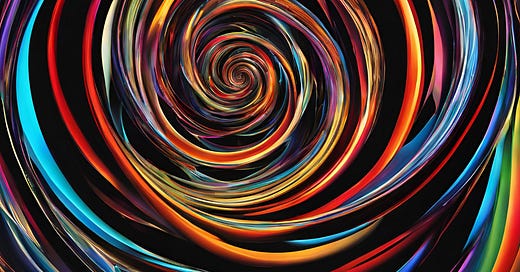"The first time I masturbated, I remember in the heat of the night, wet and horney in bed, I couldn't touch my clitoris with my hands. And then I realised my watch wristband has a firm curved shape. I took it off and dropped it down, my hand holding it like a fishing pole waiting for contact. I slipped it under my pajamas and slowly began stroking my clitoris by moving the watchband up and down to the point where I orgasmed." —Alice Wong
"Indeed, persistent shortcomings in disaster planning disproportionately threaten the lives of 61 million disabled people nationwide, leaving them two to four times more likely to die or sustain critical injuries during a disaster." —Marianne Dhenin
In the past month I've read two essays I think about every day—Alice Wong's "Disability, pleasure, and ageing: The pleasure principle" published by Archer Magazine, an Australian publication about sexuality, gender and identity, and "Hurricane Milton Confirmed What Disabled Citizens Feared Most" by Marianne Dhenin in Atmos Magazine: Climate and Culture.
Besides the absence of even a smidge of sex about disabled people in books, movies, or even whispered sharing during girl sleepovers, a lot of us grew up being told overtly that we had no sexuality, almost no gender even. Like when I was in a group of new hires and a guy confided to me that he'd heard a woman was going to be training with us. He was excited. I would see, he said, how the bosses weren't such assholes when a woman was around. So I decided it was important, a duty almost, to have desire in my writing. I don't think I'm especially good at it (the writing part), but I include the sexy the most I’m comfortable. (For example: “Old Lesbian Love.”)
Alice Wong has become my lodestar in ways to write about being "a sexy beast." In an essay published by Archer Magazine, she writes with a direct, powerful clarity about the body and sex and the complexities of illness, ingenuity, and the reach of an elbow.
A certain brand of almost narcissist environmental activist will say, head tilted in a fake concern, that not everyone is going to survive and that's just how it's going to be. I know what they mean. It's okay with them if I die. We disabled people have been and will be sacrificed. It happened with COVID. It happened during Katrina. And those of us who are also old or poor or not white or some combination are especially at risk for being considered expendable both in the preparation for natural disasters and during the recovery efforts.
Marianne Dhenin is a queer, disabled journalist whose article in Atmos brought her to my attention for the first, belated time. "When the International Association of Emergency Managers surveyed members on the accessibility of their response systems, almost 50% said that they did not believe those systems effectively met the needs of people with disabilities." My interjected comment would be about the half who think their services are accessible. Really. How many times have I been told something is accessible, and it so very much is not. And I'm a fairly simple gal accessibility wise—give me a no-step entrance and wide enough doors, and I can usually make it work. Although in my seventies, that is changing.
As different as the subject matter and style of these essays, the thematic strands wind around each other, embracing and then separating. This dance between them is already influencing my plans for a next essay, the next chapter in this novel-in-progress, the next fantastical short story for a would be collection. Read widely and wildly is what I tell myself and any other writer who cares to listen.
Audio Version:





Thanks for the tip, Sandra! Checking out Marianne Dhenin now!